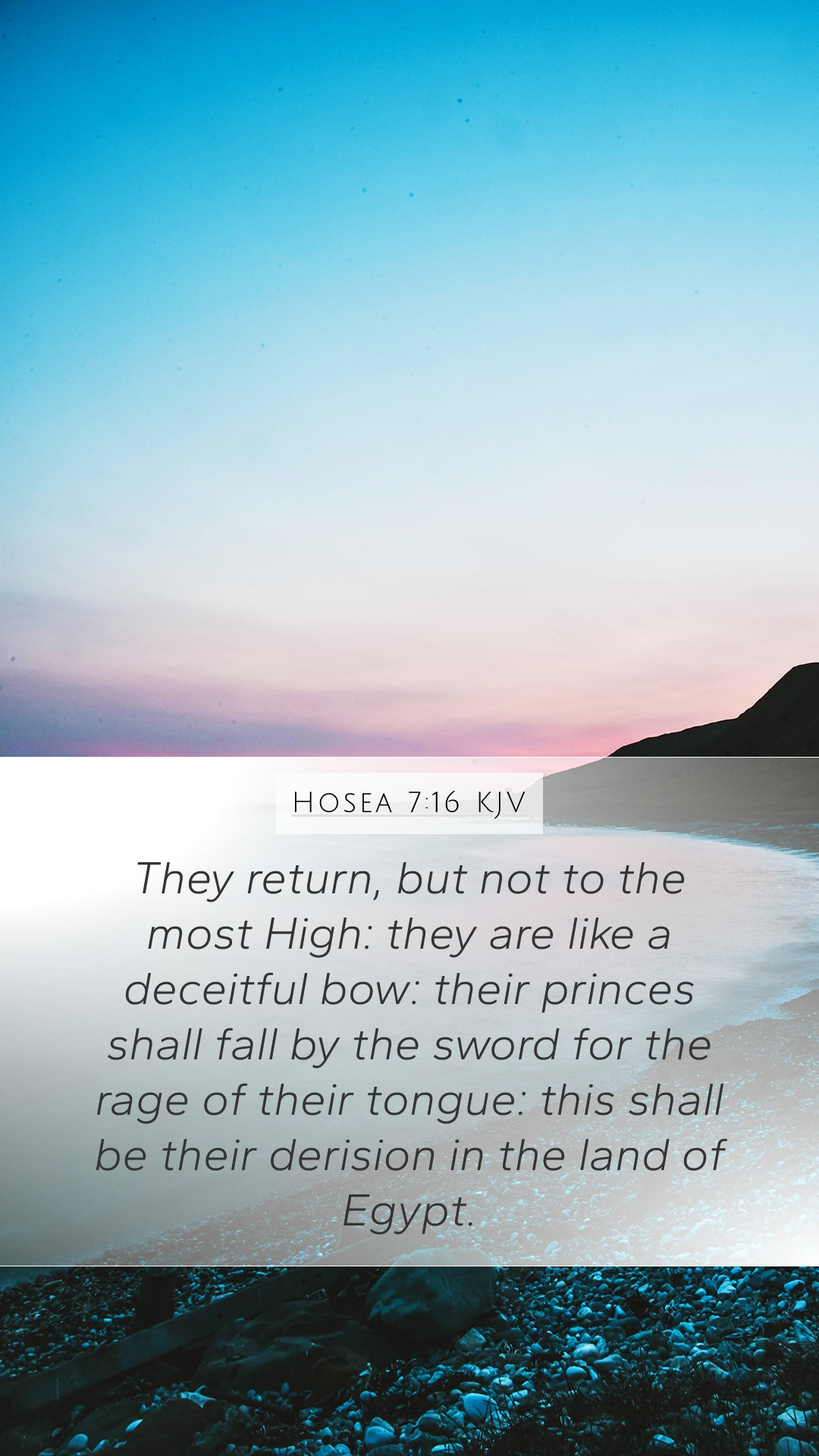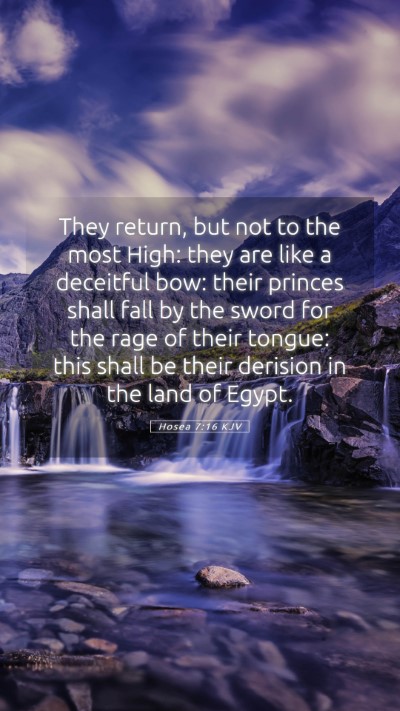Old Testament
Genesis Exodus Leviticus Numbers Deuteronomy Joshua Judges Ruth 1 Samuel 2 Samuel 1 Kings 2 Kings 1 Chronicles 2 Chronicles Ezra Nehemiah Esther Job Psalms Proverbs Ecclesiastes Song of Solomon Isaiah Jeremiah Lamentations Ezekiel Daniel Hosea Joel Amos Obadiah Jonah Micah Nahum Habakkuk Zephaniah Haggai Zechariah MalachiHosea 7:16 Meaning
What is the meaning of Hosea 7:16?
They return, but not to the most High: they are like a deceitful bow: their princes shall fall by the sword for the rage of their tongue: this shall be their derision in the land of Egypt.
Hosea 7:16 Bible Verse Meaning
Understanding Hosea 7:16
Bible Verse: Hosea 7:16 - "They return, but not to the most High: they are like a deceitful bow: their princes shall fall by the sword for the rage of their tongue: this shall be their derision in the land of Egypt."
Verse Interpretation and Analysis
This verse from the Book of Hosea offers a profound commentary on the spiritual state of Israel. It highlights the futility of the nation's attempts to return to God without true repentance and sincerity. Below, we delve into the insights from respected public domain commentaries to provide a nuanced understanding of this verse.
1. Matthew Henry's Commentary
Matthew Henry notes that this verse reflects the unfaithfulness of Israel. Their return to God is not genuine; it's merely a superficial gesture. Henry emphasizes that Israel's fickle nature is likened to a "deceitful bow" which fails to hit its target. This imagery suggests that their efforts are insincere and ultimately ineffective.
2. Albert Barnes' Notes
Albert Barnes points out that the phrase "they return, but not to the most High" indicates a false return to religion without a heart change. The leaders, described as "princes," will face judgment for their deceitful leadership. Barnes stresses the severity of their situation, reinforcing that punishment is imminent due to their rebellious choices, thus indicating the need for a sincere relationship with God.
3. Adam Clarke's Commentary
Adam Clarke expands upon the metaphor of the "deceitful bow." He explains that a bow is meant to shoot arrows, symbolizing mission and purpose. In Israel's case, their spiritual disconnection leads to failure in fulfilling their divine purpose. Clarke emphasizes that the "rage of their tongue" signifies the destructive nature of their words and gossip which contribute to their downfall, paralleling the consequences of unrestrained speech among leaders.
Key Themes and Insights
- False Repentance: The Israelites' return to God is superficial, indicating a lack of true repentance and commitment.
- Deceptive Leaders: The princes (leaders) are warned of their impending doom as they lead the people into further distance from God.
- Consequences of Speech: The verse closes with a warning of judgment stemming from the destructive power of their words.
- Symbolism of the Bow: Represents failure in achieving their spiritual goals due to deceitfulness.
Application of Hosea 7:16
Applying the lessons from Hosea 7:16 to daily life encourages deeper self-reflection regarding one's authenticity in spiritual matters. It also illustrates the impact of leadership and communication in fostering a just community. The dangers of insincerity in seeking God serve as an important reminder for modern believers to strive for genuine faith and transparency in their relationship with God.
Cross References
- Psalm 78:34-37: Discusses Israel's hypocrisy in their relationships with God.
- Jeremiah 3:10: Highlights Israel's treachery in their return to God.
- Isaiah 1:19-20: Calls for true obedience and the consequences of rebellion against God.
Conclusion
Hosea 7:16 serves as a critical reminder of the dangers of superficial spirituality and the importance of genuine repentance. Through examining the meanings of this verse from various biblical commentaries, we see a clear call to return to God with sincerity and authenticity. This analysis not only enriches our biblical understanding but also provides invaluable lessons for our spiritual journeys.
Further Bible Study Resources
For those interested in deepening their understanding of Scripture, consider utilizing various Bible study tools, joining Bible study groups, or exploring online Bible study platforms. These resources can provide additional insights and foster more profound discussions on significant passages such as Hosea 7:16.


